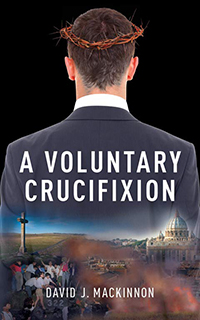Reviews
Nonfiction Review by Neil Boyd
David J. MacKinnon, A Voluntary Crucifixion (Oakville: Guernica, 2019). Paperbound, 396 pp., $25.
 My initial response to this book was not positive—too much detail about the author’s self-indulgences, and a style of writing that at times might be described as cringeworthy. Here’s a quick example, a summation of his text: “I have now reached inside and torn this story out of my entrails.” But there is a serious side to this book, with an important subject matter, notwithstanding the author’s fondness for descriptions of long evenings with Cutty Sark, Gigondas, and his often frantic and occasionally over-detailed recounting of various minutiae from his life.
My initial response to this book was not positive—too much detail about the author’s self-indulgences, and a style of writing that at times might be described as cringeworthy. Here’s a quick example, a summation of his text: “I have now reached inside and torn this story out of my entrails.” But there is a serious side to this book, with an important subject matter, notwithstanding the author’s fondness for descriptions of long evenings with Cutty Sark, Gigondas, and his often frantic and occasionally over-detailed recounting of various minutiae from his life.
It has been an interesting life, however. Born in 1954 into a successful family, the author is, as he suggests, very much a member of this MacKinnon clan. His grandfather was a judge in Saskatchewan and his father a Justice of the BC Supreme Court. David MacKinnon is also a lawyer himself, and it is his thoughts about the law that elevate this book. MacKinnon has lived in Paris, graduated from the Sorbonne, practised law in Montreal, but has also, to paraphrase an introduction to the book, “discovered society from the bottom up.” He has, for example, worked in “a hellish toilet factory” as a kiln loader, as a morgue attendant, and in a very cold winter “on the Alberta tundra, moving oil rigs.”
In addition to the author’s focus upon himself, the other focus of this book is the Papal Bulls of Discovery of 1455 and 1493. These edicts gave the Spanish and the Portuguese the right to lands that they “discovered,” based on the notion that they had the right to spread Christianity to those who did not believe—and that taking ownership of these “discovered” lands (and their peoples) was entirely appropriate. This line of thinking was similarly endorsed by French and British monarchs. MacKinnon was a critical organizer of the 2016 Long March to Rome, the purpose of which was to ask the Pope to revoke the two Papal Bulls as “contrary to modern international law and as violations of the basic human rights of aboriginal peoples worldwide.” As he writes, this would be an opportunity “to explain, for the first time in history, how the Papal Bulls of Discovery had impacted tragically on the destiny of indigenous peoples worldwide by dividing the entire world into believers and heathen.”
MacKinnon then addresses (and rejects) the solutions that have been offered by the Canadian government: the Truth and Reconciliation Commission and section 35 of the Constitution Act of 1982, with its recognition and affirmation of the existing aboriginal and treaty rights of the aboriginal peoples in Canada. He writes that hubris was the theme of both section 35 and the Charter of Rights and Freedoms, granting “supra-constitutional” protection to aboriginal rights. “That Pandora’s Box would eventually become untenable, and now, the country is in a legal and political shamble, but one that no one dares acknowledge.” He writes of truth and reconciliation, “The Canadian government’s approach—a truth and reconciliation commission à la South Africa, was what it was. Canada is not that different from Africa—the overriding issue is getting resources to market without being caught in a squeeze by multinationals or China or the US or all of the above.”
At one point, he appears to urge “a restoration of everything stolen since the Age of Discovery,” but then quotes approvingly from another source, “We need an acknowledgement.” It’s difficult to understand MacKinnon’s condemnation of both section 35 of the Constitution Act and the Truth and Reconciliation Commission. They are, after all, acknowledgements of policies and acts of wrongdoing on the part of governments—policies and actions that can no longer be defended.
We are all products of our families and communities, however, and those environments lead us to imagine problems differently and to take different approaches to the conflicts and hardships that we have seen. For MacKinnon, growing up in a deeply religious Catholic family, it is perhaps not surprising that he sought to make peace with his faith—with the repeal of the Papal Bulls. I am about MacKinnon’s age and, like him, I have been trained in law. My family life also included, with some regularity, that unfortunate admonition to which he refers: “Children should be seen and not heard.” Unlike him, however, I grew up in a family that had largely rejected religious belief. Like many today, I would be unlikely to look to a religious institution in order to resolve a longstanding social conflict.
But this book is one that I ultimately warmed to, perhaps most strongly in its closing pages, where MacKinnon replays an interchange between his wife and himself. He is a principled and caring man—not one I find any easy agreement with, but principled and caring nonetheless.
“It comes down to entitlement, David,” she states. “Men drawing straight lines over maps with rulers, and men carving up the globe when they don’t even know whether lands exist or not.”
“So, where does that leave us,” he asks.
“Us? We just get on with it, mister ex-Director.”
“Just like that.”
“Correct. Just like that. We, actually you, David, get on with it. None of these people want to change. The saviours don’t want to save and the victims don’t want to be saved. So, let’s just get on with it, all right? Let’s save ourselves, for once.”
—Neil Boyd









